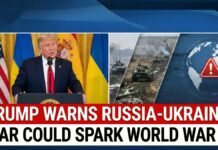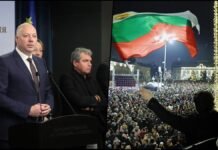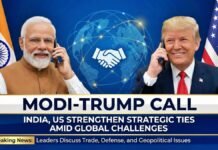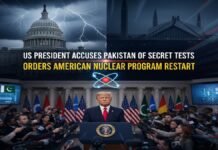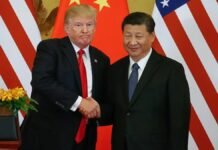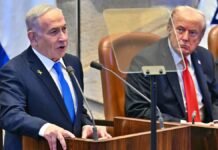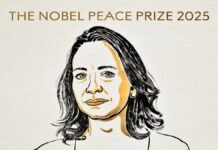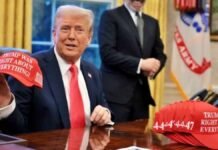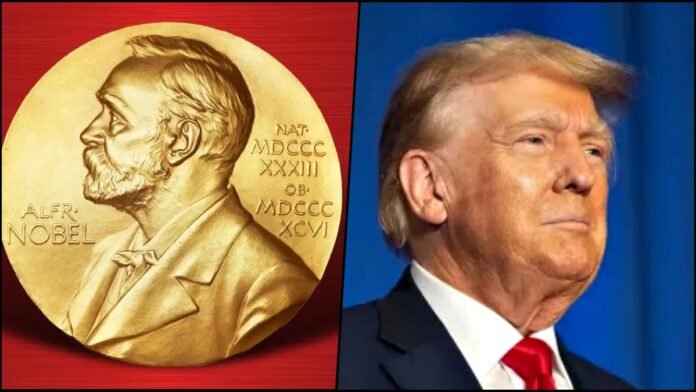
Key Points
- 2025 Nobel Peace Prize to be announced on Friday, October 10, 2025 at 11 AM Oslo time (2:30 PM IST)
- President Donald Trump campaigns for award citing role in Israel-Hamas ceasefire and hostage release agreement
- White House labels Trump “The Peace President” following Gaza peace deal announced day before Nobel announcement
- 338 candidates nominated 244 individuals and 94 organizations competing for prestigious honor
- Norwegian Nobel Committee maintains 50-year confidentiality rule for nominee names
- Experts skeptical of Trump’s chances despite public campaign and high-profile endorsements
- Prize established by Alfred Nobel’s 1896 will, first awarded in 1901
- Five-member Norwegian parliamentary committee decides winner through majority vote
- Award honors work for “fraternity between nations” and reduction of armed conflicts
New Delhi: The global spotlight turns to Oslo on Friday, October 10, 2025, as the Norwegian Nobel Committee prepares to announce the winner of the 2025 Nobel Peace Prize at 11:00 AM local time (2:30 PM Indian Standard Time). This year’s announcement carries heightened intrigue due to intense speculation surrounding potential recipients, most notably President Donald Trump’s vocal self-promotion as a deserving candidate based on recent diplomatic achievements in the Middle East.
The timing of this year’s announcement has become particularly significant following the historic Israel-Hamas ceasefire agreement and hostage release deal finalized just one day before the Nobel announcement. The Trump administration has seized on this timing, with the White House officially dubbing the President “The Peace President” in social media posts highlighting the Gaza agreement as evidence of his peacemaking credentials.
Trump’s Campaign for Nobel Recognition
President Donald Trump has mounted an unprecedented public campaign for the Nobel Peace Prize, repeatedly asserting his entitlement to the award based on what he characterizes as extraordinary achievements in conflict resolution during his current term. Since returning to office in January 2025, Trump has pointed to several diplomatic initiatives as evidence of his peace-building credentials:
Israel-Hamas Ceasefire: The comprehensive peace agreement between Israel and Hamas, announced on October 9, 2025, represents Trump’s most significant diplomatic achievement. The multi-phase deal includes immediate cessation of hostilities in Gaza, release of all hostages, and a framework for long-term peace—a breakthrough that eluded previous administrations despite years of efforts.
Middle East Diplomacy: Building on Abraham Accords foundations from his first term, Trump has continued facilitating normalization agreements between Israel and Arab nations, reshaping regional dynamics.
Other Conflict Mediation: Trump has claimed involvement in preventing or de-escalating conflicts in various global hotspots, though specifics vary and independent verification of these claims remains limited.
The White House’s strategic messaging campaign intensified immediately following the Gaza ceasefire announcement. By branding Trump “The Peace President” precisely one day before the Nobel announcement, the administration clearly seeks to influence public perception and potentially the Nobel Committee’s deliberations—though experts note that committee decisions are finalized well before the announcement date, making last-minute influence unlikely.
Expert Skepticism Despite Campaign
Despite Trump’s vigorous self-promotion and supportive statements from political allies, Nobel Prize experts and analysts widely agree that the President faces slim prospects of receiving the 2025 award. Several factors contribute to this skepticism:
Timing Considerations: The Gaza ceasefire was announced on October 9, 2025—just one day before the Nobel announcement. The Norwegian Nobel Committee typically finalizes its decision weeks or even months in advance, meaning the committee could not have fully assessed the ceasefire’s durability or long-term impact when making their selection.
Implementation Uncertainty: Peace agreements only hold value if successfully implemented. The Nobel Committee traditionally prefers to recognize sustained peace achievements rather than recent agreements whose permanence remains unproven. The committee’s previous experiences with premature peace prize awards have made it more cautious.
Committee Independence: The Norwegian Nobel Committee jealously guards its independence and has historically resisted external pressure or public campaigns. Trump’s vocal self-promotion may paradoxically work against his candidacy, as the committee typically favors quiet diplomacy over public self-aggrandizement.
Political Polarization: Trump remains one of the world’s most politically divisive figures. The Nobel Committee, while not immune to political considerations, typically seeks consensus candidates whose peace credentials transcend partisan divisions.
Historical Patterns: Recent Nobel Peace Prize selections have favored grassroots activists, human rights defenders, journalists, and multilateral institutions rather than major world leaders, reflecting evolving committee priorities.
Record Nomination Field
The Norwegian Nobel Committee has confirmed receiving 338 nominations for the 2025 Nobel Peace Prize 244 individual nominees and 94 organizational candidates. This substantial field reflects the breadth of global peace work and the wide range of individuals and institutions eligible for consideration.
Under Nobel Prize rules, nominations can be submitted by:
- Members of national governments and international courts
- University professors in specific fields including history, philosophy, law, and theology
- Directors of peace research institutes
- Previous Nobel Peace Prize laureates
- Members of the Norwegian Nobel Committee
- Former and current members of the Norwegian Parliament
While nominee names officially remain confidential for 50 years, many nominations become public knowledge when nominators choose to disclose their submissions. This year’s publicly known nominees reportedly include:
Climate Activists: Environmental leaders working on climate change mitigation and environmental peacebuilding
Human Rights Defenders: Activists risking their lives to protect human rights in authoritarian regimes
Conflict Mediators: Diplomats and organizations facilitating peace negotiations in ongoing conflicts
Humanitarian Organizations: NGOs providing relief in conflict zones and advocating for international humanitarian law
Press Freedom Advocates: Journalists and organizations defending media freedom against increasing global repression
The diverse nominee pool reflects the Nobel Committee’s broad interpretation of “peace work” encompassing conflict resolution, human rights, humanitarian assistance, environmental protection, and democratic institution-building.
Alfred Nobel’s Vision and Prize History
The Nobel Peace Prize traces its origins to the 1895 will of Swedish industrialist, inventor, and chemist Alfred Nobel, who died in 1896. Nobel best known for inventing dynamite and accumulating substantial wealth through his explosive patents dedicated the majority of his fortune to establishing prizes recognizing outstanding contributions to humanity.
Nobel’s will specified that the peace prize should be awarded “to the person who shall have done the most or the best work for fraternity between the nations and the abolition or reduction of standing armies and the formation and spreading of peace congresses.” This language reflects late 19th-century peace movement priorities, though the committee has interpreted it flexibly to address evolving concepts of peace.
The first Nobel Peace Prize was awarded in 1901 to Jean Henri Dunant (founder of the Red Cross) and Frédéric Passy (leading peace activist), establishing a precedent of honoring both institutional humanitarian work and individual peace advocacy.
Over 124 years, the prize has been awarded to 111 individuals and 28 organizations, with notable recipients including:
Political Leaders: Theodore Roosevelt (1906), Woodrow Wilson (1919), Mikhail Gorbachev (1990), Nelson Mandela and F.W. de Klerk (1993), Barack Obama (2009)
Human Rights Activists: Martin Luther King Jr. (1964), Aung San Suu Kyi (1991), Malala Yousafzai (2014)
International Organizations: International Committee of the Red Cross (three times), United Nations (2001), European Union (2012)
Peacemakers: Anwar Sadat and Menachem Begin (1978), Yitzhak Rabin, Shimon Peres, and Yasser Arafat (1994)
The prize has occasionally courted controversy, with some selections proving prescient while others aged poorly as recipients failed to fulfill their peace promise or became embroiled in subsequent conflicts.
Selection Process and Committee Structure
The Nobel Peace Prize differs from other Nobel categories in being awarded by a Norwegian rather than Swedish institution. While prizes in physics, chemistry, medicine, literature, and economics are decided by Swedish academies, Alfred Nobel specified that the peace prize should be determined by a committee appointed by the Norwegian parliament.
The Norwegian Nobel Committee consists of five members appointed by the Storting (Norwegian Parliament) for six-year terms, though members typically serve longer through reappointment. The committee’s composition roughly reflects the political balance of the Norwegian parliament, though members are expected to act independently rather than as party representatives.
The current committee includes individuals with backgrounds in law, politics, history, and international relations, bringing diverse perspectives to peace prize deliberations.
Selection Timeline:
January-February: Nomination deadline (January 31) followed by preliminary review of all nominations
March-August: Committee members and appointed advisers conduct detailed investigations of the most promising candidates, examining their work, impact, and suitability under Nobel’s criteria
September-October: Committee meetings intensify as members debate candidates and work toward consensus or majority decision
Early October: Final decision made by majority vote days or weeks before public announcement
October 10: Public announcement of winner at Oslo press conference
December 10: Award ceremony in Oslo on anniversary of Alfred Nobel’s death
The selection process emphasizes thorough investigation and deliberation, with committee members taking seriously their responsibility to identify individuals or organizations whose work genuinely advances peace.
50-Year Confidentiality Rule
A distinctive feature of the Nobel Peace Prize is the strict 50-year confidentiality period for nomination information. The Norwegian Nobel Committee does not publicly disclose who was nominated, who submitted nominations, or details of committee deliberations until five decades after the award year.
This policy serves several purposes:
Protecting Nominees: Confidentiality shields nominees particularly human rights defenders and activists in repressive countries from potential retaliation or harassment based on their Nobel candidacy
Preserving Committee Independence: Secrecy reduces external pressure on committee members and allows frank internal deliberations without public scrutiny
Preventing Campaigning: The confidentiality rule theoretically discourages public lobbying campaigns, though nominators can still voluntarily disclose their submissions
Historical Research: The eventual release of nomination archives provides valuable historical documentation of peace efforts and committee decision-making
Despite the official confidentiality policy, many nominations become public when nominators choose to announce their submissions. This year, various organizations and individuals have publicly disclosed nominating specific candidates, providing glimpses into the nominee pool while still leaving the committee’s shortlist and deliberations confidential.
Potential Contenders and Speculation
While the committee’s actual deliberations remain secret, Nobel watchers and betting markets have identified several potential frontrunners beyond President Trump:
Climate and Environmental Leaders: Given increasing recognition of climate change as a peace and security threat, environmental activists and organizations working on climate diplomacy could receive consideration
Women’s Rights Advocates: Activists working to protect women’s rights in Afghanistan, Iran, and other countries facing severe gender-based repression
Pro-Democracy Activists: Leaders of democratic movements in authoritarian states, particularly those facing imprisonment or persecution for peaceful political activity
Humanitarian Organizations: NGOs providing critical assistance in conflict zones including Ukraine, Sudan, Yemen, and other crisis areas
Conflict Mediators: Behind-the-scenes diplomats facilitating peace negotiations in ongoing conflicts
Press Freedom Champions: Journalists and organizations defending media freedom amid global democratic backsliding
The committee has in recent years favored grassroots activists over major political figures, suggesting individuals working at considerable personal risk may have stronger candidacies than world leaders like Trump, regardless of diplomatic achievements.
Previous Controversial Awards
The Nobel Peace Prize has weathered criticism and controversy throughout its history, with some awards generating immediate backlash while others appear questionable in retrospect:
Barack Obama (2009): Awarded less than nine months into his presidency “for his extraordinary efforts to strengthen international diplomacy,” the prize was widely criticized as premature, with Obama himself expressing surprise at the selection
Aung San Suu Kyi (1991): Initially celebrated for her democratic activism in Myanmar, Suu Kyi’s later role in government during the Rohingya crisis prompted calls for prize revocation, though Nobel statutes prohibit rescinding awards
Henry Kissinger and Le Duc Tho (1973): Awarded for Vietnam War peace negotiations, the selection proved controversial given ongoing fighting and Kissinger’s involvement in controversial policies. Le Duc Tho declined the prize.
Yasser Arafat, Shimon Peres, and Yitzhak Rabin (1994): Recognition of Oslo Accords architects became complicated after peace process failures and Arafat’s subsequent actions
These historical examples underscore the challenges inherent in recognizing peace work initiatives may fail, recipients may disappoint, and premature awards may not withstand historical scrutiny. The committee’s experience with controversial selections has likely made it more cautious about recognizing recent agreements or politically divisive figures.
What to Expect Friday
On Friday morning, October 10, 2025, the Norwegian Nobel Committee’s announcement will conclude months of speculation. The winner receives:
Recognition: Global acknowledgment as the year’s most significant contributor to peace
Monetary Award: Currently 11 million Swedish kronor (approximately $1 million USD)
Gold Medal: Featuring Alfred Nobel’s profile and peace-specific imagery
Diploma: Unique artistic diploma created specifically for the recipient
Platform: Enhanced international visibility and moral authority for continued peace work
The December 10 award ceremony in Oslo’s City Hall will feature speeches, musical performances, and presentation of the prize by the committee chair, with Norway’s royal family in attendance.
Regardless of who receives the 2025 Nobel Peace Prize, the award will generate renewed attention to global peace efforts and the individuals and organizations working often at great personal cost to reduce conflict, protect human rights, and build more peaceful societies. Whether President Trump’s Middle East diplomacy receives recognition this year or in future cycles remains to be seen, but the Friday announcement will undoubtedly spark global conversation about what constitutes meaningful peace work in the 21st century.





